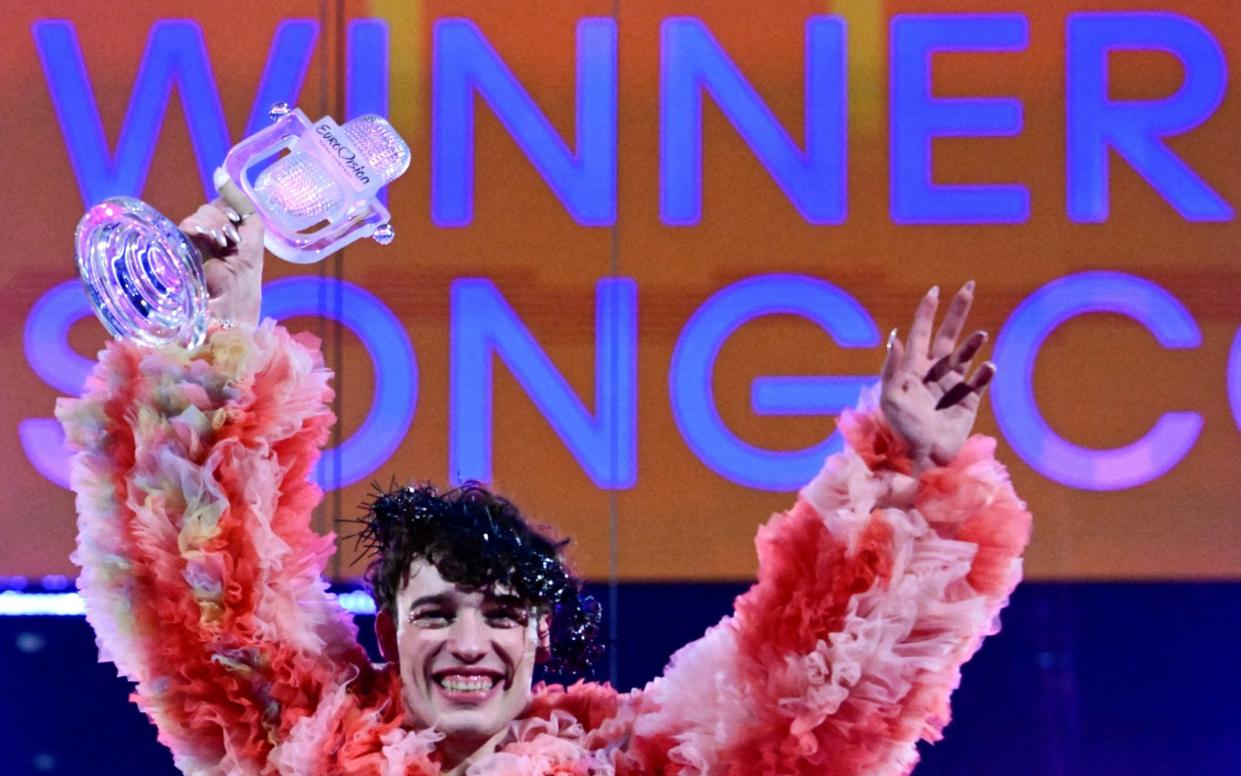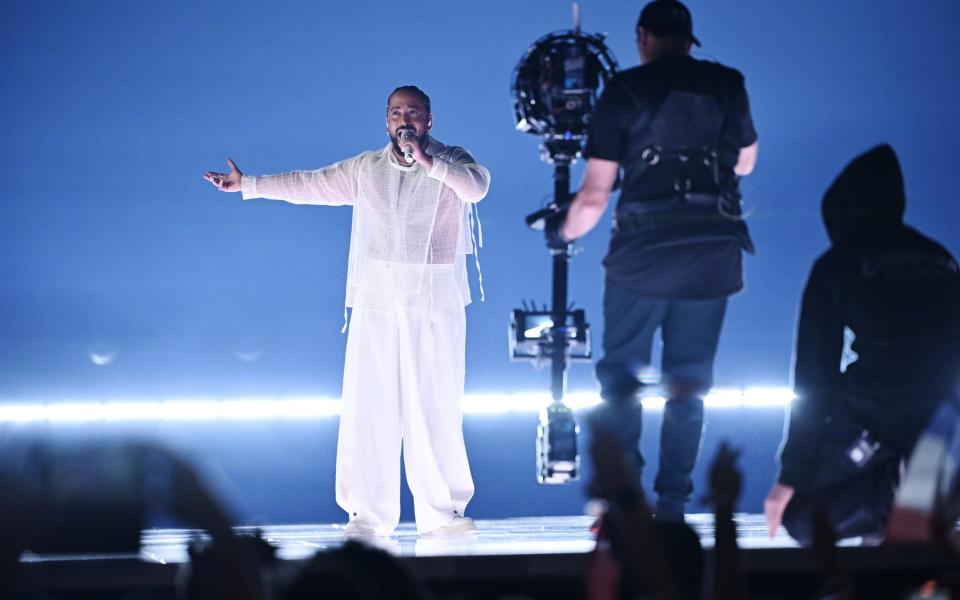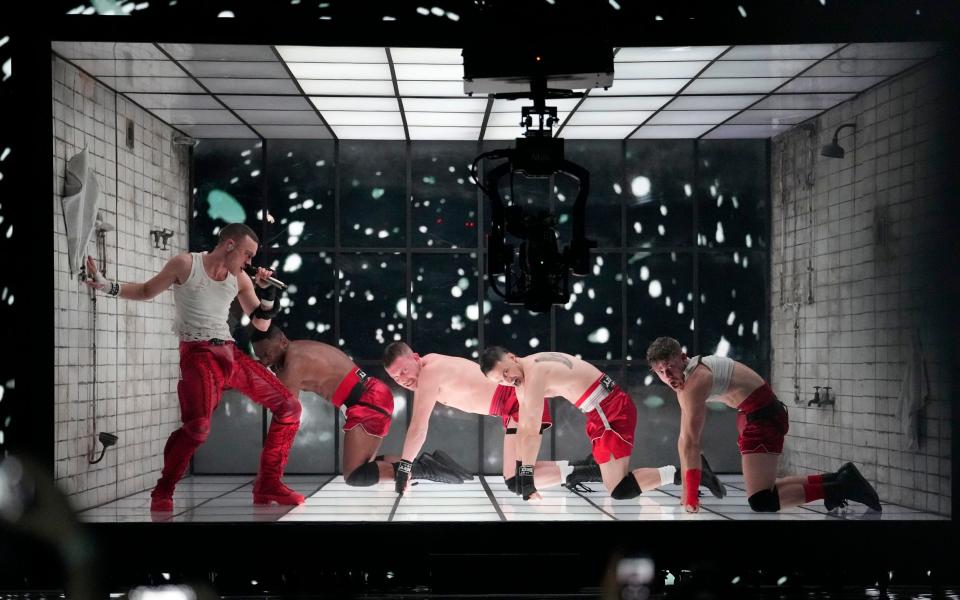Inside the Eurovision arena: what you didn’t see on TV

The best place by far to watch Eurovision is at home, on the sofa. The song contest was founded in 1956 by the nascent European Broadcasting Union as an experiment in international telecasts and has grown to be one of the world’s most-watched shows every year by constantly improving the experience for TV viewers.
That said, here in Malmö it was fascinating to see what was going on when the cameras looked the other way.
In the arena, usually home to the mediocre Malmö Redhawks ice hockey team, a small army of technicians and engineers kept the show flowing seamlessly for those watching at home. Between each act they had exactly 53 seconds – the length of the “postcard” introductory videos seen on TV – to swap one elaborate set for another.
Each time one set was cleared, a half-dozen men rushed onto the stage with brushes and looked like curlers frantically trying to speed up the stone as they swept the LED stage. It was at once hypnotising and anxiety-inducing to see the techies at work, as they were always fiddling up to the last possible moment. Despite the late spanner in the works of the Netherlands’ Joost Klein being disqualified, they didn’t miss a single beat.
Seeing the show in person gives the audience the feeling of peeking behind a magician’s curtain. Nemo Mettler triumphed by performing The Code on a huge spinning and see-sawing silver disc. What you will not have noticed at home is that it is not mechanical: three crew members twisted the plate and tipped it up and down, always staying out of the carefully choreographed TV shots as the Swiss artist sang, danced and balanced.
Later, there was a moment while Slimane of France was singing his powerful ballad, Mon Amour, when a small figure wearing a black hoodie vaulted onto the stage. It was at this point that I thought the week’s well-publicised controversies would come to a head with a protester making a statement about Israel’s inclusion or the exclusion of the Netherlands. I need not have worried. It quickly became obvious that he was sent on stage to make sure that the cameraman, who twice fearlessly sprinted backwards towards the edge of the stage, did not fall over the edge and into the throng of fans below.

(As an aside, when Slimane stopped using his microphone and sang a capella, the whole arena hushed as his voice filled a cavernous arena of 9,000 well-refreshed partygoers. It was one of the most memorable, and moving, moments of the night.)
The most visually impressive performance for home viewers was undoubtedly Olly Alexander’s Dizzy, in which – thanks to camera trickery – the Brit appeared to be in a grotty municipal gym’s shower block while in zero-gravity space. In reality, the five on stage — Alexander and his four backing dancers — never left the floor and, while it looks impressively realistic on telly, the fact that they were confined to a box where much of the live audience could not see them meant we felt a bit disconnected from the performance.
For all its organiser’s talk of bringing people together, Eurovision is also big business. Brits may not think so because it airs on the BBC without adverts. If you want to know why you had to endure iffy jokes from hosts Petra Mede and Malin Åkerman, or a rambling look back at Swedish presenter Karin Falck’s technical difficulties in 1975, blame the licence fee. Other, luckier countries had cut to an ad break at that stage. In the arena, punters took the opportunity to recharge their glasses and avail themselves of the facilities.
In Malmö, it was hard to move without seeing adverts for Moroccan Oil, the haircare brand (which makes sense as a partnership, given the sheer amount of pomade on display among the acts and audience members alike). The official bars were stocked with Baileys liqueur that could be drunk with eye-popping amounts of sugar in chocolate or espresso martinis served with a bar of marzipan.

This weekend’s contest was sponsored for the first time by Royal Caribbean International, the cruise line, and it turned over four of its ships to become floating Eurovision parties across the continent. Punters sang karaoke versions of Eurovision hits, took part in dance lessons and themed quizzes and, obviously, watched the grand final.
Some of the notables in the arena’s VIP hospitality area included Jedward, Ireland’s weirdo X Factor twins who have competed twice at the song contest, and Leo Varadkar, the country’s recently defenestrated prime minister, who was also spotted doing Eurovision karaoke with his husband.
Another surprise in the arena came in the form of the reaction to Israel’s Eden Golan after a build-up in which you would be forgiven for thinking that the whole of Eurovision was against her taking part. The atmosphere was genuinely mixed, with vociferous cheering (as she started and sang her choruses) and booing (when she switched to singing in Hebrew). The mood shifted as the points were being dished out, with cries of derision every time Israel was awarded a point by one of the 37 national juries.
A few eagle-eyed social media users spotted that Mettler’s reign as champion got off to an inauspicious start. After accepting the elaborate glass microphone trophy, the Swiss singer proceeded to break its base as the credits started to roll by hitting it on the stage a little too hard.
In the press conference afterwards, Mettler compared the hiccup to the controversies surrounding this year’s song contest. “The trophy can be fixed,” said the 24-year-old. “Maybe the Eurovision needs a bit of fixing too.”

